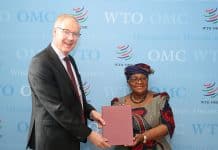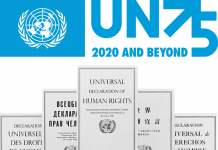After the new Norwegian government stepped into power in October 2005 – many changes have come about. Although the UN has been an important foundation for Norway’s foreign policy for a long time, the current government has a special emphasis on the UN and Norway as a peace nation. The Prime Minster wrote in an Op-Ed in Norwegian Dagsavisen, Oslo, in the beginning of May that “the government wants a UN-led world, and not a world in which law is taken into the hands of the most powerful ones”. As follows, the government considers the UN to be “the most important instrument for global cooperation and the essential cornerstone of Norway’s foreign policy” (Political Program 2005).
Yet, this does not come alone. On May 16th the Minister for Development Erik Solheim declared –as the first country ever – that the government is seriously considering a debt relief. The Minister’s statement is also to be found in the government’s political program, which says “The UN must develop criteria for categorizing illegitimate debt and such debt should be relieved” (Political Program 2005). The Minister has also been successful in regard to his effort for an engagement by the World Bank to undertake studies on “illegitimate debt”. Moreover, he has announced that he intends to put pressure also on the UN to engage in similar studies.
The bold proposition has evidently gotten major attention in international forums. In an Op-Ed in the Norwegian Magazine Ny Tid, Oslo, titled “Go Norway!,” Cambridge-researcher, Noreena Hertz, praises the Norwegian Minister’s fight against illegitimate debt. “I would like to thank Mr. Solheim and the rest of the Norwegian government. Your actions are crucial, and you have the support of the entire international civil society.” Many civil society actors have been upbeat about Mr. Solheim’s proposal. Among these were Norwegian Church Aid, Changemaker and SLUG.
In addition, Norway will chair an international pilot group for new finance mechanisms for development purposes. The Minister asserts, in an Op-Ed in the weekly magazine Morgenbladet, that the government’s aim is to mobilize increased support for the French initiative regarding a solidarity tax on plane tickets. Until then, he announces, it will use existing CO-2 taxes on air plane fuel for development purposes. The Minister stresses the great importance of stable income for development. He also plans to work for a solidarity tax on medicines, and for a brand new international purchasing system for the latter.
The Socialist Party’s mark on all of this is easily recognizable. First time ever in government, the party’s influence on certain parts of the government’s political program is obvious. The program also calls for some change in Norway’s relation to the Breton Woods institutions. For example, it says that “to a larger extent, there should be a shift from multilateral aid to the World Bank towards UN-led development programs and humanitarian efforts.”
The government’s conclusion on debt relief will be ready in the National budget for 2007, which will be presented in October this year, reports Norwegian daily Aftenposten, Oslo.
Sources: Aftenposten (Oslo), Dagsavisen (Oslo), Morgenbladet (Oslo), Ny Tid (Oslo), Regjeringserklæringen fra Soria-Moria (Gonvernment’s political program)








